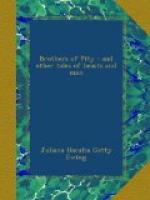But when I saw him coming, I rolled myself up as tight as a wood-louse, and as my ears were inside I really did not hear what else he said. But I was not a whit the less resolved to see my cousins.
One day my father bustled home.
“Upon my whine,” said he, “they live on the fat of the land. Scraps of all kinds, apples, and a dish of bread and milk under their very noses. I sat inside a gorse bush on the bank, and watched them till my mouth watered.”
The next day he reported—
“They’ve cooked one—in clay. There are only five now.”
And the next day—
“They’ve cooked another. Now there are only four.”
“There won’t be a cousin left if I wait much longer,” thought I.
On the morrow there were only three.
My mother began to cry. “My poor dear nephews and nieces!” said she (though she had never seen them). “What a world this is!”
“We must take it as we eat eggs,” said my father, with that air of wisdom which naturally belongs to the sayings of the head of the family, “the shell with the yolk. And they have certainly had excellent victuals.”
Next morning he went off as usual, and I crept stealthily after him. With his spines laid flat to his sides, and his legs well under him, he ran at a good round pace, and as he did not look back I followed him with impunity. By and by he climbed a bank and then crept into a furze bush, whose prickles were no match for his own. I dared not go right into the bush for fear he should see me, but I settled myself as well as I could under shelter of a furze branch, and looked down on to the other side of the bank, where my father’s nose was also directed. And there I saw my three cousins, tethered as he had said, and apparently very busy over-eating themselves on food which they had not had the trouble of procuring.
If I had heard less about the cooking, I might have envied them; as it was, that somewhat voracious appetite characteristic of my family disturbed my judgment sufficiently to make me almost long to be flitted myself. I fancy it must have been when I pushed out my nose and sniffed involuntarily towards the victuals, that the gipsy man heard me.
He had been lying on the grass, looking much lazier than my cousins—which is saying a good deal—and only turning his swarthy face when the gipsy girl, as she moved about and tended the fire, got out of the sight of his eyes. Then he moved so that he could see her again; not, as it seemed, to see what she was doing or to help her to do it, but as leaves move with the wind, or as we unpacked our noses against our wills when my father said he smelt valerian.
She was very beautiful. Her skin was like a trout pool—clear and yet brown. I never saw any eyes like her eyes, though our neighbour’s—the Water Rat—at times recalls them. Her hair was the colour of ripe blackberries in a hot hedge—very ripe ones, with the bloom on. She moved like a snake. I have seen my father chase a snake more than once, and I have seen a good many men and women in my time. Some of them walk like my father, they bustle along and kick up the leaves as he does; and some of them move quickly and yet softly, as snakes go. The gipsy girl moved so, and wherever she went the gipsy man’s eyes went after her.




